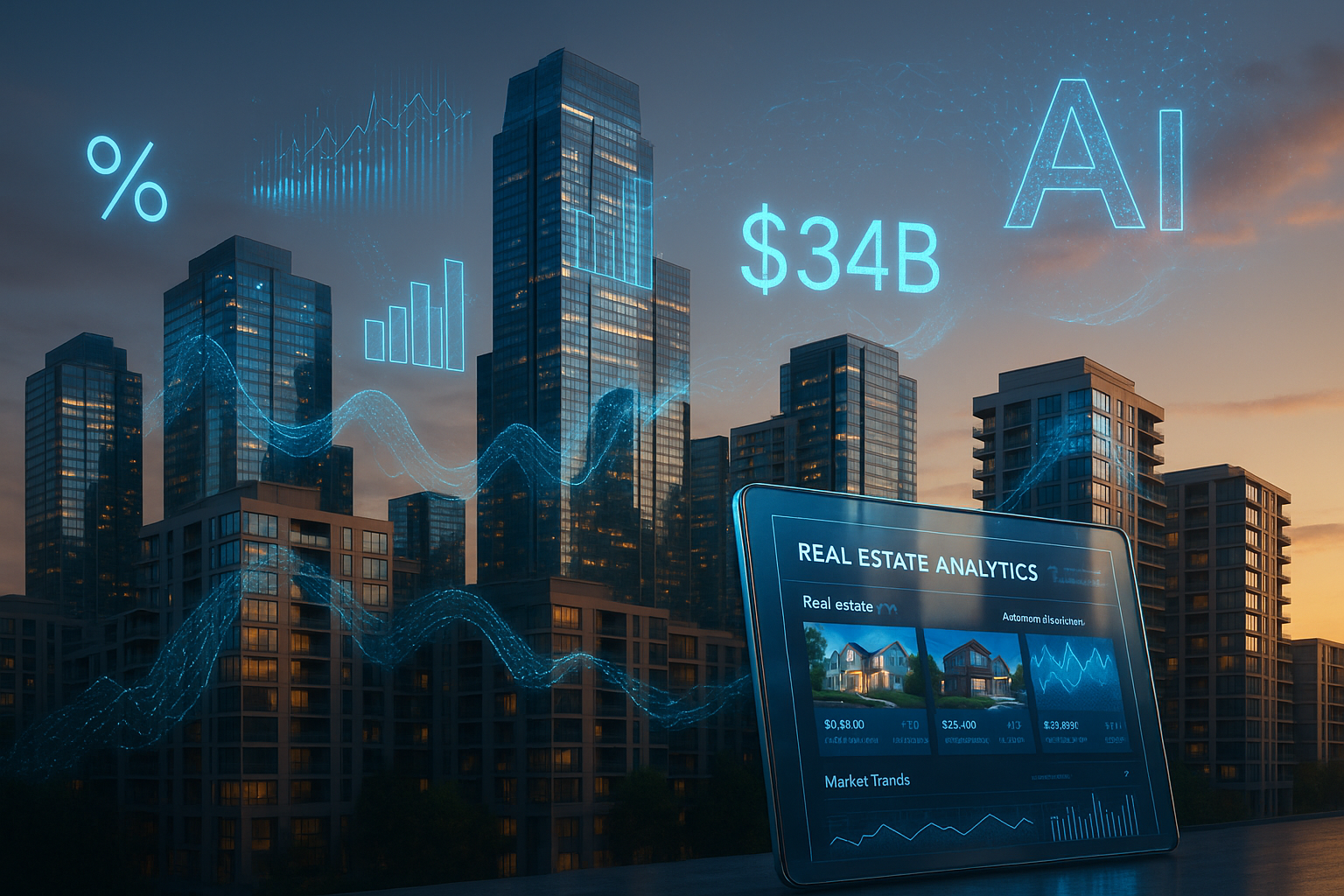
Innovations in AI and Agent Workflows: How Artificial Intelligence Is Transforming Commercial Real Estate Investment
Caiyman.ai Research Team
AI Solutions Architect
Commercial real estate is undergoing a rapid transformation as AI-powered agents and intelligent workflows revolutionize how investments are sourced, evaluated, managed, and marketed. New breakthroughs in artificial intelligence are automating complex tasks, delivering real-time insights, and fundamentally changing the way CRE professionals and investors compete in the market.
The AI Revolution in Commercial Real Estate
The adoption of AI in commercial real estate (CRE) is no longer a distant vision—it's quickly becoming an industry-wide imperative. According to JLL's 2024 Future of Work Survey, more than 90% of companies plan to support their corporate real estate functions with AI and technology, and 61% have already begun piloting AI use cases (JLL Spark). This surge is driven by the pressing need for improved efficiency, accuracy, cost control, and strategic guidance in an industry where every delay or oversight can mean millions lost or gained.
Venture capital is fueling the AI-powered PropTech sector, with 62% of AI-focused PropTech companies now VC-backed and investment expected to remain strong in the years ahead (JLL Spark). As foundational models and generative AI technologies mature, barriers to building and deploying CRE AI solutions are quickly dropping, unleashing a new competitive era in the market (EY).
Innovations in Deal Sourcing and Underwriting
AI has evolved from an assistant for analysts to a core driver of value in deal sourcing and underwriting. As Propmodo explores, advanced systems like Diald now rank CRE deals by statistical “likelihood of success” and can analyze structured and unstructured data—pricing, market trends, even community sentiment—to surface the best investment opportunities (Propmodo). In some cases, AI is already outperforming human analysts on speed and objectivity, promising a future where entire investment lifecycles adopt machine learning agents for transactional tasks.
Reonomy’s AI-powered platform is another example, providing unparalleled property, owner, and transaction insights across more than 54 million commercial properties in the US. Their algorithms connect disparate data—public records, sales, debts, demographics—allowing professionals to identify off-market opportunities, perform robust underwriting, and accelerate outreach (Reonomy).
Process automation is becoming the norm: Tools like n8n enable investors to automate daily property deal discovery, using Zillow’s API to generate targeted lists, perform investment calculations, and email results—all integrated through low-code workflows (n8n.io). The negotiation table itself is shifting, as next-generation AI agents initiate Letters of Intent and could soon conduct bot-to-bot negotiations, accelerating transactions and reducing the risk of bias or oversight (Propmodo).
Enhanced Due Diligence and Asset Management
Modern CRE due diligence is no longer just a legal or financial process—it’s a data science challenge. Generative AI platforms now scan vast document troves, flag potential risks, and rapidly model outcomes under different scenarios, supercharging investment decision-making (EY).
Portfolio management, once a manual slog, is becoming more strategic and data-driven. Take Colliers’ Portfolio AI: This platform instantly aggregates real estate obligations, identifies optimization strategies, and delivers recommendations that can impact up to 40% of portfolio decisions (NAIOP). Automated extraction through AI-driven OCR (Optical Character Recognition) has allowed clients to avoid missed payments and react to crises such as system cyberattacks. AI-powered predictive analytics and asset management software are routinely uncovering hidden inefficiencies and opportunities, while supporting compliance and internal audit processes.
Platforms like Reonomy also transform due diligence, tying together ownership data, transaction history, and demographic trends so investors quickly see the “big picture” of each asset and its local context (Reonomy).
Client Interaction and the Rise of AI-Driven Services
AI is not only empowering professionals—it’s also revolutionizing the client experience. The world’s first AI real estate agent, eSelf AI, has already closed more than $100 million in sales for a leading brokerage, providing highly detailed, 24/7 property guidance to clients around the globe (HousingWire). This agent delivers instant answers, custom listings, and virtual tours to prospective buyers, bridging time zones and outperforming traditional staff with omniscient portfolio knowledge.
Meanwhile, a new generation of agent-focused PropTech platforms is streamlining client communication and deal management. As outlined by RealTrends, tools like Saleswise, Wise Agent, and Sidekick automate market analysis, lead scoring, client texting, and even content creation—helping agents nurture relationships at every stage (RealTrends). AI chatbots, digital concierges, and intelligent recommendation engines are fast becoming staples of the modern CRE engagement toolkit.
Investment Trends, Challenges, and the Future of AI in CRE
As PropTech innovation accelerates, so does the appetite of investors and startups targeting this space. The majority of AI-enabled PropTechs are now revenue-generating or profitable, and new company launches are aligning with the explosive potential of generative AI. However, current market gaps remain—particularly in offering deeper predictive analytics, custom workflow automation, and integrated asset management tools (JLL Spark).
Challenges are also emerging around explainability, compliance, data security, and AI’s environmental impact, as platforms process ever-larger data sets in pursuit of actionable insights (NAIOP). Regulatory guidelines, such as those outlined by the White House in 2023, are guiding ethical AI design, transparency, and governance in CRE workflows (EY).
The next phase? AI will move from point solutions to orchestrated ecosystems, with CRE leaders collaborating on data governance, cross-functional platform integration, and product roadmaps built around user needs. As startups and global tech providers vie for market share, the winners will combine AI’s rapid-fire analysis with the creative, strategic judgment unique to human professionals (Propmodo).
Conclusion: Partnering for a Smarter Future in CRE Investment
The commercial real estate industry stands at an inflection point—where AI agents and intelligent automation are not only transforming how value is created, but shaping new standards for transparency, efficiency, and strategic growth. By embracing agentic workflows and responsibly integrating AI, CRE investors and firms can unlock opportunities faster, manage risk smarter, and deliver exceptional value to clients and stakeholders. Now is the time to experiment, adapt, and lead the next era of real estate investment.
Sources
- Propmodo: How Long Until AI Replaces Commercial Real Estate Analysts?
- HousingWire: World's First AI Real Estate Agent Has Already Made $100M in Sales
- RealTrends: 20 AI Tools for Real Estate Agents to Get a Competitive Edge
- n8n.io: Real Estate Daily Deals Automation with Zillow API, Google Sheets and Gmail
- Reonomy Web Application: Property Intelligence, Property Search
- EY: Generative AI is Transforming Commercial Real Estate
- JLL Spark: The Future of AI in PropTech
- NAIOP: AI’s Growing Impact on Commercial Real Estate
Share this article
Related Articles

State of AI Agents in Residential Real Estate 2025: Trends, Use Cases, and Smart Implementation for Brokers and Realtors
Explore how AI agents are reshaping residential real estate in 2025—from breakthrough trends to real-world use cases, top tools, and smart integration strategies tailored for brokers and realtors.

AI Revolution in Real Estate 2025: How Technology is Driving $34B in Industry Transformation
Discover how artificial intelligence is revolutionizing real estate with $34 billion in projected efficiency gains, 37% task automation potential, and game-changing technologies reshaping every aspect of property operations in 2025.

AI in Real Estate Finance: $34B Opportunity Transforms Property Investment in 2025
Discover how artificial intelligence is creating $34 billion in efficiency gains for real estate finance, with 37% of tasks now automatable and major platforms achieving 99%+ accuracy in property valuation.